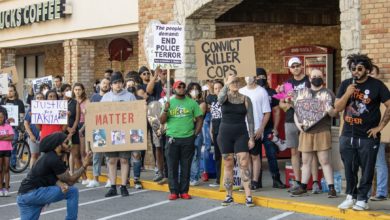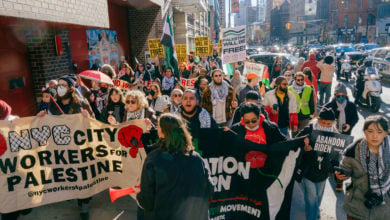The following article was written by a participant in the Oct. 1 Occupy Wall Street march on the Brooklyn Bridge, and among the 700 protesters trapped and arrested there. Police brutality and illegal arrests are taking place in cities and towns throughout the U.S. against the Occupy movement.
The New York Police Department has been making front-page news recently for repeated acts of brutality and repression against the growing protests on Wall Street and occupations around the country.
After the infamous case of pepper-spraying peaceful protesters, a week later the NYPD conducted mass arrests on the Brooklyn Bridge. Seven hundred marchers, myself included, were trapped by police, arrested, held in flexicuffs for hours in the rain and then given a number of bogus charges and violations.
On my bus and in the cell at 1 Police Plaza, I wound up getting into conversations with people about the police.
There was a clear divide with some arguing that our “brothers and sisters” in the police department are just “regular working people” who don’t make much money, whose pensions are threatened by Wall Street, and who are therefore part of the “99%.”
The job of the police
Some say the police are “just doing their job.” True, but the job of the police is not just any other job. The repressive institutions of the state—the courts, the police, the military and the prisons—exist primarily to protect not society as a whole, but a society’s ruling class; in short, the 1%.
Just think about it. How does the 1% control the 99%? Why haven’t the masses of people risen up against the 1% in an assertion of their right to live free? In addition to the media and the school system spreading lies that justify the rule of the 1%, they also resort to force, violence, and intimidation to keep the 99% in our place.
That’s where the police come in—to keep the “order” by which the property rights and profits of the 1% come over all else. When you can’t make your rent or mortgage, the banks and landlords call in the police to evict you. When workers’ strike or try to take over their workplaces, the 1% calls in the police to bust it up. When we march, the police are called in to surround us and intimidate others from joining.
If the 1% wants to put an end to these occupations, it won’t be Jamie Dimon, the Koch brothers, Rupert Murdoch or Mike Bloomberg who come in with batons and guns to order us out.
Are cops part of the working class?
Cops depend on wages and salaries like the rest of us—that is true. They might have a series of grievances against their ranking officers and the government.
But every cop knows that the moment they publicly sympathize with a people’s movement, or refuse to carry out repressive order, they will be out of work. They understand that part of their job is to stop the people from rising up.
So while cops as individuals are not part of the ruling class, they cannot be considered part of the oppressed classes either. Defining one’s position in society is much more than just income level, but what one’s actual function in society is. They are an arm of the ruling class, whose function in society is to maintain the rule of the rich over all of us. They are dependent upon and completely linked to the dictatorship of the rich. They protect the growing and unsolvable contradictions of capitalism, with their guns and batons always facing in our direction.
Rank-and-file soldiers in the military, who typically serve only for a few years, have at several key historical moments defected, torn off their uniforms, and switched back to the workers’ side in large numbers. Professional police officers, who have chosen to join that institution of repression as their life’s work, almost never do.
Learning from history and from others
We are not the first group from the 99% to take action. History has shown time and again that the police have, without fail, been used to repress, infiltrate, entrap and sabotage people’s movements. This has happened during each great wave of resistance in this country, from the labor movement of the early twentieth century, the radicalization during the Great Depression, the anti-war movement during the Vietnam era, and the Black liberation movement of the 1960s and 1970s.
This is also an important issue for the movement to continue to expand into the hardest-hit sectors of the 99%. In the country’s poorest and oppressed communities, harassment, brutality and humiliations at the hands of the police are part of daily life. Police officers are on the frontlines funneling millions of unemployed youth, especially in Black and Latino communities, into the prison system. For the Occupy movement to spread into such communities, it will have to be clear about this reality.
Learning from our own experiences
The arrest of 700 of us on the Brooklyn Bridge was no accident. It was an attempt by the NYPD, which is in the pocket of the big banks and Wall Street, to weaken the growing Occupy Wall Street movement. They want our movement to be associated with criminality and danger, so millions of working people who sympathize with our message will be too afraid to join us.
The Partnership for Civil Justice Fund filed a class-action free speech lawsuit against the NYPD, describing the roundup of activists on the Brooklyn Bridge as a “premeditated, planned, scripted, and calculated effort to sweep the streets of protesters and disrupt a growing protest movement.”
Investigative journalists have recently uncovered the multimillion-dollar donations given to the NYPD by huge Wall Street companies like J.P. Morgan Chase and Goldman Sachs. J.P. Morgan Chase just finished making the largest donation in history to the New York City Police Foundation—a total of $4.6 million. Police Commissioner Raymond Kelly dutifully sent CEO and Chairman Jamie Dimon a note expressing his “profound gratitude” for the company’s donation/bribe.
The 1% understands how important the police are. That is why every other needed governmental program gets cut—from education to firefighters—while the police and military budgets go unaffected.
In city after city, occupations are being confronted by police violence and harassment. In some places, the police have already shut them down. We have to learn from these experiences. If cops want to be considered part of the 99%, there is only one way: by quitting their jobs as the enforcers of the 1%.






